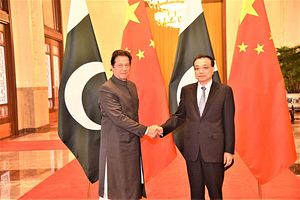Pakistani Finance Minister Asad Umar, in an interview to China Global Television Network (CGTN), emphatically stated that it was wrong to blame the China-Pakistan Economic Corridor (CPEC) project for Pakistan’s economic problems. According to Umar, who was speaking from the sidelines of the China International Import Expo in Shanghai, “Pakistan has a debt problem for sure, but Pakistan does not have a China debt problem”
Umar attributed Pakistan’s current economic mess to other reasons – specially the lack of exports and failure to generate “enough foreign currency inflows to be able to service the debt.”
Later, while briefing the press on Pakistani Prime Minister Imran Khan’s recent China visit, Umar claimed that, while the economy does face numerous challenges, the country’s balance of payments crisis had ended. The Pakistani finance minister stated that financial assistance from Saudi Arabia (worth $6 billion) as well as Chinese assistance had helped in financing the $12 billion gap.
Umar’s statement was made a day before an International Monetary Fund (IMF) delegation arrived in Pakistan to negotiate loans to Pakistan.
While Pakistan’s Tehreek-e-Insaaf (PTI) government, as well as sections of both the Pakistan media and Chinese media, have made repeated reference to China’s commitment to provide financial assistance, Beijing has not specified any amount. Senior officials have spoken about helping Pakistan, and referred as usual to Pakistan as China’s “all weather partner,” but without putting forward any specifics.
A few things are clear after Khan’s China trip. First, some of the statements made by members of Khan’s cabinet, with regard to the terms and conditions of the CPEC not being favorable to Pakistan, have clearly not been appreciated by Beijing. Abdul Razak Dawood, Khan’s adviser on commerce, textiles, industry and production and investment, told the Financial Times that the negotiations carried out by the previous Pakistani government were not well thought out (and unfavorable to Pakistan). “The previous government did a bad job negotiating with China on CPEC… they gave away a lot,” Dawood was quoted as saying. Later on he had to issue a denial.
Meanwhile, Pakistan’s Railway Minister Sheikh Rasheed also stated that Islamabad could not afford the level of Chinese loans, and would like to reduce the cost of the Karachi-Peshawar rail line from $6.2 billion to $4.2 billion.
In response, China has repeatedly stated, that CPEC could not in any way be held responsible for Pakistan’s current economic challenges. Foreign Minister Wang Yi, during his visit to Pakistan, in September 2018, pointed out that only four of the 22 CPEC projects underway used concessional loans from China.
Going by Khan’s statements in China regarding CPEC, as well as Umar’s statements on China not being responsible for Pakistan’s current economic woes, Beijing seems to have sent a firm message to the Pakistani government to avoid any public criticism of the project or general economic ties with China.
To help Pakistan save face, Beijing has of course offered assistance to bail it out from the current crisis. China has also stated that it would ensure that Pakistan benefits from CPEC. But it has largely hit back at criticisms as unfounded. The CGTN on November 4 carried a story titled “Anti-CPEC propaganda fails as Beijing wins Islamabad’s trust” while held that differences between both sides were being exaggerated.
Rather than reducing Pakistan’s dependence upon China, Khan’s recent visit has only increased it. Interestingly, it is not just the government – even sections of Pakistan’s strategic analysts seem to have no problem with the country’s increasing dependence upon Beijing. Successive governments have made earnest efforts to reduce Pakistan’s dependence upon external forces, but such attempts have been in vain so far and nothing is likely to change in the imminent future.
It is important to understand that China will deal with resentment and discontent arising from its “debt trap diplomacy” differently. In the case of Africa, where other countries (including Japan and India) are trying to increase their presence and local resentment is rising, Beijing is keen to give the impression that it is taking the misgivings of local populations seriously. This was evident not just from President Xi Jinping’s speech at the 2018 Forum for China-Africa Cooperation, but in a number of articles appearing recently in the Global Times, where there have been oblique calls for China to understand the local situation better.
Pakistan, on the other hand, is solely dependent upon China, and does not have too many options. Ties with the United States remain particularly vexed. Foreign Minister Shah Mehmood Qureshi, during his visit to the United States in October 2018, urged the resumption of military aid to Pakistan but to little effect. Apart from this, the Pakistan army, which calls the shots in Islamabad, has close ties with Beijing.
In conclusion, Islamabad’s economic dependence upon Beijing is only likely to increase in the near future. Pakistan is not likely to be among those countries to raise the red flag against Beijing’s predatory economics. As long as Pakistan has no option but to seek economic support from China, to make the argument that skepticism vis-à-vis CPEC is misplaced is a bit of a stretch.
Tridivesh Singh Maini is a New Delhi-based policy analyst associated with the Jindal School of International Affairs, OP Jindal Global University, Sonipat.

































